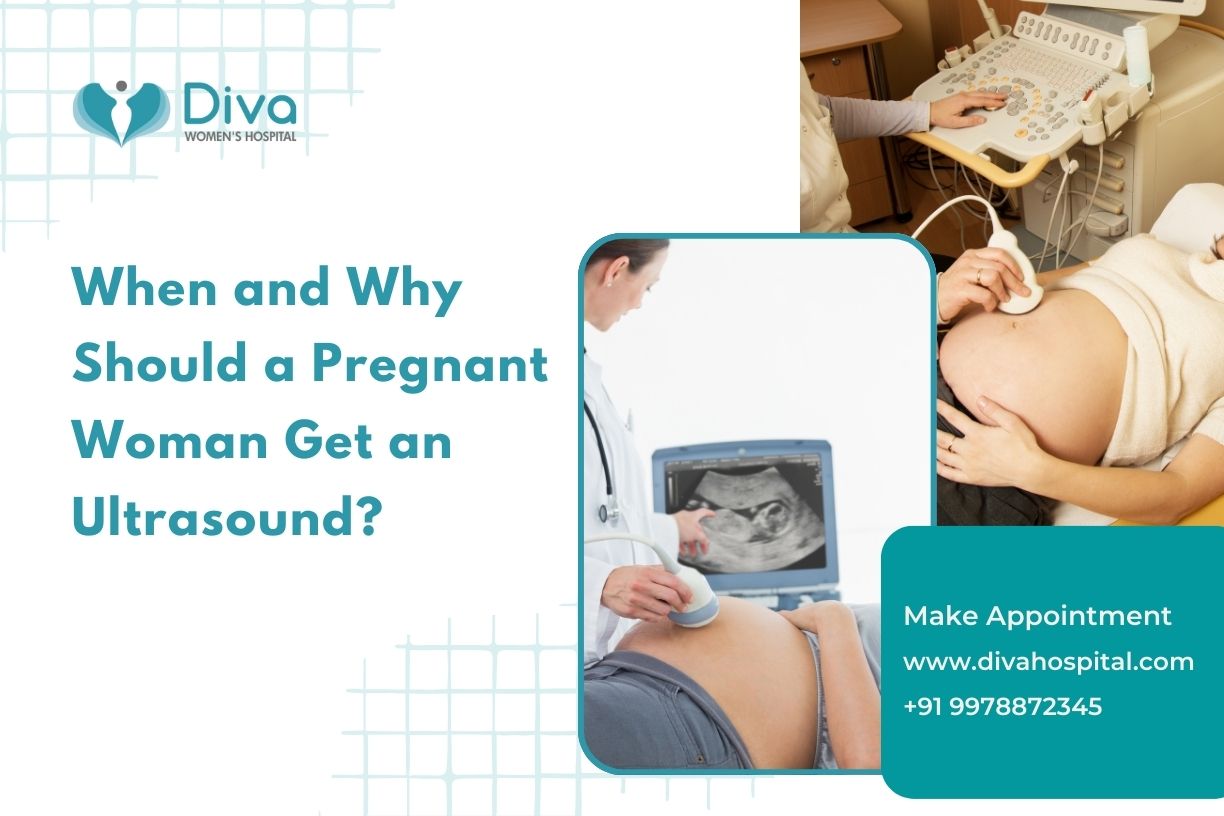While pregnancy is a magical adventure, it is always a whirlwind of questions and concerns for the mummy-to-be. One of the most important aspects of your antenatal care is the pregnancy ultrasound by which practitioners and parents can visualise the growing infant within the uterus. While it is more than a mere examination, it is a reassuring snapshot into the health, growth, and general happiness of your child.
Diva Hospitals believes timely, precise pregnancy ultrasound is essential to ensure expectant mothers feel comfortable and secure on their journey. By understanding when and why ultrasound is done, mothers can own their health and make a decision regarding their baby together.
What is Pregnancy Ultrasound?
Pregnancy ultrasound uses high-frequency sound waves to create an image of the unborn baby, placenta, uterus, and amniotic fluid. It is totally safe and noninvasive and has been the standard of care in obstetrics for more than 20 years.
In addition to demonstrating pictures, ultrasounds assist physicians:
- Track fetal growth and development
- Verify the baby’s position
- Assess the placenta and umbilical cord
- Identify potential problems in their earliest stages
- Comfort parents regarding the baby’s progress
Actually, a pregnancy ultrasound is usually the first time a parent bonds with the baby, as they watch their baby move, kick, or even suck their thumb during the ultrasound.
When Should a Pregnant Woman Have an Ultrasound?
The majority of women will have two or three significant ultrasounds throughout their pregnancy. The specific timing will differ based on individual situations, but the typical scans are:
1. First Trimester Scan (6–9 weeks)
- Confirms pregnancy and heartbeat
- Establishes the number of babies (single or twins)
- Estimates the due date
This is typically the first ultrasound you have during your pregnancy, as provides peace of mind that everything is going well.
2. NT Scan (11-14 weeks)
- Screens for chromosomal defects such as Down syndrome
- Assesses the thickness of the baby’s neck (nuchal translucency)
- Monitors early growth
This scan is a useful pregnancy ultrasound because it will help detect any early health problems.
3. Anomaly Scan (18 – 22 weeks)
- A thorough scan to check the baby’s organs, spine, brain, heart, limbs
- To detect structural defects
- To check the placenta position and volume of amniotic fluid
This is usually the most accurate ultrasound in pregnancy, and parents regard it as a special occurrence.
4. Growth Scan (28–32 weeks)
- Tracks the size and weight of the baby
- Verifies the adequate flow of blood and oxygen
- Identifies growth restriction risks
This scan assures that the baby is developing at a healthy rate and getting adequate nourishment.
5. Late Pregnancy Scan (36–40 weeks)
- Ensures baby’s position (head-down or breech)
- Ensures placenta functioning and blood flow through the cord
- Helps doctors with delivery planning process
Not all women need this, but in some situations a late pregnancy ultrasound is very important to prevent last-minute possible complications.
Why are Ultrasounds Important During Pregnancy?
Every pregnancy ultrasound has a purpose and it is so much more than seeing the baby. Here are the most important:
- Early Confirmation – For reassurance that the pregnancy is healthy and progressing normally.
- Health Monitoring – To monitor for potential risks, such as ectopic pregnancy, placenta previa, or growth restrictions.
- Reassurance – Helping the mothers and the family have confidence in the health of the baby.
- Preparation for Delivery – Ensuring the position and well-being of the baby for delivery.
- Complication Management – Detecting high-risk conditions early, so that physicians can respond quickly.
When you have an ultrasound done in pregnancy, you are also looking after your health at an important time in your life.
Why Ultrasound Is Safe and Effective
Some mothers may be concerned about how often they have ultrasounds done, but there is evidence showing that ultrasound scans should be carried out throughout pregnancy, evidence that supports the practice and shows that they are safe and not harmful to the baby. Ultrasounds use sound waves, rather than radiation, to create images and this evidence places it as one of the safest imaging investigations conducted in antenatal care.
At Diva Hospitals we have the latest equipment and very experienced practitioners who are able to complete every ultrasound for pregnancy safely, obtain the right outcome and clarify the relevant reliable image.
Choosing the Right Hospital for Ultrasound
Although ultrasounds are common, where you have them done is important. At Diva Hospitals, we provide:
- Latest Technology – State-of-the-art machines with high resolution for clear imaging
- Expert Team – Trained gynecologists and radiologists with specializations in maternal healthcare
- Patient Comfort – Stress-free setting for expecting mothers
- Comprehensive Care – For every ultrasound in the pregnancy journey, from the first trimester to delivery, a comprehensive maternity care plan will always be there!
Our promise isn’t just to perform the scan but to join you so you can be clear, comfortable, and confident in your pregnancy journey.
Ultrasounds aren’t just scans; they are glimpses into the womb; they provide an opportunity for the parents to bond with their baby and they also provide opportunities for the physician to monitor the health of both the mother and baby and optimise a healthy pregnancy. Ultrasound can provide some reassurance in the first trimester of pregnancy by confirming the pregnancy being viable, reassurance that the baby is developing in the second trimester also helps with monitoring the growth patterns in the third trimester. Every pregnancy ultrasound matters.
At Diva Hospitals, we imagine and dream that every pregnant woman gets the best care possible. Guided by our experts and with the latest ultrasound in pregnancy, we assist you in experiencing your motherhood journey with confidence and peace of mind.

